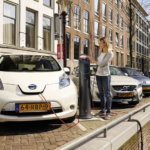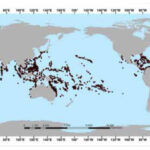Met de herovering van Congress door de republikeinen is alle hoop op CO2-mitigatie wetgeving vervlogen. Cap-n-trade is dead, de Chicago Climate Exchange (CCX) die in Al Gore’s en Obama’s wildste dromen had moeten groeien tot $ 10 triljard, is zojuist gestopt met handelen nadat de prijs van een ton CO2 was gekelderd naar 5ct. Deze CCX gaat nu verder als een ordinaire klimaatneutraal-aflaat-boer. De oprichting van de CCX werd wereldwijd breed uitgemeten in de main stream media (MSM). Het overlijdensbericht komt niet verder dan de sceptische blogosfeer (zie artikel).
Europa staat nu wereldwijd in zijn hemd met zijn resterende ETS-kleren-van-de-keizer-of-braafste-jongetje-van-de-klas-mechanisme. Reuters publiceerde vrijdag een lang artikel waarin we Jos Delbeke, directeur generaal van het klimaatteam van de Europese Commissie, horen zeggen hoe zeer Brussel de politieke ontwikkelingen in Amerika met lede ogen aanschouwt. Hieronder de volledige tekst. Een pregnante quote over de Europese financiële steun voor de “vergroening” van China:
That is a big issue for Europe’s poorer nations, which protest against EU demands they help finance greening China’s economy when the wealth per capita of Romania, for example, is much lower than that of Beijing.
Klimaathavik
Het bovenstaande plaatje is zeer illustratief. De dame lijkt zelfs een beetje op Lisa Heinzerling een klimaathavik die plotseling is opgestapt bij de EPA (zie boeiend artikel). En die EPA was nu nog de laatste strohalm waar CO2-haters in de Verenigde Staten op hoopten. Daar zal nu ook wel niks meer van komen ondanks de warrige uitspraken van Obama over de EPA in de persconferentie na zijn verkiezingsnederlaag.
Hieronder het Reuters verhaal integraal.
E.U. sees U.S. “disappearing” as partner on climate
By David Stanway and Pete Harrison
BEIJING/BRUSSELS | Fri Nov 5, 2010 2:06pm EDT
(Reuters) – The European Union sees the United States “disappearing as a partner” in international climate talks after President Barack Obama suffered setbacks in midterm elections, the EU’s top climate official said on Friday.
Obama has conceded that big Republican gains in Tuesday’s elections undermined prospects for comprehensive legislation to tackle climate change.
“We’re very disappointed about the United States going that way and dropping climate legislation,” said Jos Delbeke, director general of the European Commission’s climate team.
“We see the U.S. disappearing as a partner in achieving meaningful climate action,” he told Reuters in a telephone interview from Beijing.
Obama’s election in 2008 and his talk of saving a “planet in peril” briefly encouraged some countries to anticipate significant progress in talks on a new U.N. treaty to slow rising emissions of greenhouse gases.
The U.S. election results have dented the few remaining expectations for a significant result at the next climate talks in Cancun, Mexico, from November 29-December 10.
Obama said at last December’s Copenhagen summit that he wanted to cut U.S. emissions by 17 percent below 2005 levels by 2020, a cut passed by the U.S. House of Representatives but not by the Senate.
“We wonder how they can achieve their 2005 commitments without going for a cap and trade scheme,” said Delbeke. “It will make it even more problematic for international climate negotiations.
Cap and trade schemes cap carbon emissions by power plants and factories by issuing a fixed quota of emissions permits which companies can trade among themselves.
The U.S. reluctance to curb planet-warming emissions may also hit plans to raise a promised $100 billion a year by 2020 to help poor nations cope with climate change.
That plan partly hinges on curbs on emissions to push up the price of carbon in mechanisms such as the EU’s Emissions Trading Scheme.
But Delbeke remained upbeat that the Cancun talks could achieve something.
“Cancun can still deliver, for example decisions on adaptation and deforestation, while progress should be made on the monitoring, reporting and verification question, but beyond that, the outlook is worrying.”
“In the long term that may be a possibility,” Delbeke told reporters at a briefing in Beijing earlier in the day.
“If we live in a world where the EU is the only one that has made a commitment and the U.S. is doing nothing, and other countries including China are doing nothing, then we would have a problem and I see this debate coming up. So far we have been holding back,” he said.
“If China were to implement a cap and trade system that would be extremely helpful to help prevent such trade mechanisms coming into place.” He praised China’s progress so far on cap and trade.
Delbeke also warned the fast-growing economy against misrepresenting its circumstances in climate talks.
“China is an emerging economy, is behaving like an industrial nation in many respects, and cannot use the song of developing countries to dress up its negotiating positions,” he said.
That is a big issue for Europe’s poorer nations, which protest against EU demands they help finance greening China’s economy when the wealth per capita of Romania, for example, is much lower than that of Beijing.
(Writing by Pete Harrison, editing by Rex Merrifield and Keiron Henderson)







@Theo
Als er sprake is van duidelijk te bewijzen corruptie en zelfverrijking door Pachauri e.a., ben ik geheel en al voor strafrechtelijke vervolging. Elke ambtenaar die gemeensschapsgeld in zijn zak stopt, verdient een rechtszaak aan zijn broek.
Lastiger wordt het als je spreekt over ‘kwaadaardig en bewust desinformeren’. Dat is juridisch nauwelijks hard te maken. Zulke processen leveren in het algemeen geen prettige beelden op. In totalitaire regiems is het schering en inslag, in democratieën gelukkig niet. Mij schiet alleen de McCarthy-periode te binnen. Waar niemand in de VS graag aan herinnerd wordt. Je begeeft je op het pad van politieke processen en voor je het weet ben je bezig de halve bevolking achter tralies te zetten.
En zo keert het tij.
Persoonlijk wil ik de mensen die willens en wetens uit deze leugens geld hebben weten te slaan voor het gerecht zien.
Voor criminele activiteiten tegen de mensheid.
Interessant is dat de cap-and-trade al niet door de Senaat kwam voor deze verkiezingen. Ook veel Democraten zien er niets in, die zijn nu extra gesterkt door de winst van de Republikeinen.
Hopelijk stort hierdoor die gehele handel in CO2-emissierechten in. Een systeem dat een nieuwe financieel-economische bubble kan veroorzaken door letterlijk en figuurlijk handel in lucht.
Verder draagt het stelsel van emissierechten ook niet bij tot innovatie in produktiemethoden die kunnen zorgen voor minder uitstoot door lager energieverbruik. Het bedoelde effect (lagere CO2-emissie) wordt er niet door bereikt.
@Matthijs: Nu klinkt u net zoals sommige alarmisten die skeptici voor de rechter willen of wilden dagen, ook al voor criminele activiteiten tegen de mensheid. Mag het a.u.b. eens een toontje lager en een graadje minder? Kennelijk hebben we behoefte aan nog een hele hoop Rallies to restore Sanity.
@ Fred
Ik twijfel nog een beetje.
In mijn ogen is een goed open debat niet mogelijk als je je tegenstander bij voorbaat als crimineel behandelt. Daarmee neem ik de positie van McIntyre in.
Aan de andere kant hebben er echt kwalijke en zelfs strafbare praktijken plaatsgevonden.
Als dit ongestraft blijft, is dat een vrijbrief voor de volgende politieke hype.
Zoals al eerder opgemerkt: de biodiversiteit-scam is al van start, zelfs met een IPCC-achtig orgaan van de VN (zie http://fp.dagelijksestandaard.nl/2010/10/barenswe… )
Ik denk dat het goed zou zijn als er wat echte zakkenvullers uit de AGW groep wettelijk vervolgd zouden worden, en in ieder geval hun door bedrog verkregen subsidies zouden moeten inleveren.
Ik denk daarbij vooral aan Pachauri. Als hij inderdaad gletsjergate heeft doorgedrukt (tegen de reviews van de Indiase geleerden in) om daarmee miljoenen voor zijn instituut te krijgen, moet hij daar in mijn ogen verantwoording voor afleggen en passend gestraft worden.
Het kwaadaardig en bewust desinformeren van regeringen en – vooral – het publiek zou niet straffeloos mogen blijven. Dat is een verkeerd signaal.
Laat de "rechtspraak" maar over aan de wetenschappers.
Dat is veel effectiever.
Wat de burger kan doen is het afstraffen van de politieke opportunisten door veranderend stemgedrag.
@ Fred
Het probleem van jouw opstelling is de "als".
De vraag op dit moment is niet of ze achter de tralies moeten (dat is aan de rechter), de vraag is of er vervolging ingesteld moet worden. En pas na vervolging weet je je "als".
De verbijsterende gang van zaken in het geval van Gletsjergate en de hockeystick grafiek geeft alle reden voor een serieuze verdenking van misleiding uit eigenbelang, dus dan zou er ook volgens jou vervolging ingesteld moeten worden neem ik aan?
Dan zijn we het dus eigenlijk eens.
‘kwaadaardig en bewust desinformeren’ is "in the eye of the beholder".
De millieulobby doet het, de industrielobby doet het. Allemaal uit nobele motieven die hun respectievelijke politieke richtingen eer aan doet.
De waarheid ligt ergens in het midden, maar dat wil geen van beiden toegeven, en toch is dat de harde politieke werkelijkheid.
@ Hans
Tegen de algemene leugens van politici, industriëlen en het IPCC is weinig te doen natuurlijk. Zo werkt het systeem nu eenmaal.
Maar als Pachauri doelbewust een vals, zeer alarmerend bericht over Indiase gletsjers in een IPCC rapport op laat nemen om er héél veel miljoenen mee binnen te slepen, dan is dat iets heel anders.
Dat het doelbewust was, kan blijken uit het feit dat de reviewers bijna allemaal ernstige twijfels hadden bij de juistheid, ook de officiële Indiase experts, maar dat alle bezwaren zonder reden zijn verworpen.
En dat het uit eigenbelang was blijkt wel uit de miljoenen die hij vervolgens in de wacht heeft gesleept voor een privé gletsjerinstituut.
Zelfs als de juridische strafbaarheid niet bij voorbaat goed is vast te stellen, zou ik het toch goed vinden als er een proces kwam, als signaal aan andere zakkenvullers.
Tsja, op enig moment keert de wal het schip. Ik denk dat climategate en alle onregelmatigheden rond het IPCC daar zeker en terecht aan hebben bijgedragen.
@Hans: "de waarheid ligt ergens in het midden". Vaak klopt dat, maar het is niet alles grijs wat er blinkt. Soms is het wit. Of zwart.
Ik ben er niet rouwig om als een cap-and-trade systeem voor CO2 niet van de grond komt. Ik snap het zelf maar nauwelijks, de geldbewegingen zijn ondoorzichtig en het zal weinig veranderen aan onze huidige manier van energie opwekken.
Ik schat dat dit thema een paar jaar nodig heeft om nieuw momentum te bouwen, hopelijk heeft de wetenschap dan nieuwe, betere inzichten voor ons.
@matthijs
Dan kun je tevergeefs pleiten. De mensen die namens onze regering onderhandelden in Kopenhagen profiteren met hun fondsenwervende consultingfirma zelf van het beleid dat ze voorstaan
Neem bv de jurist Donald Pols, klimaatdirecteur van het WWF (ex milieudefensie, ex ministerie LNV), die ook lobbiet voor technologiefinanciering in China, volgens het 'clean technology'programma van WWF(dat is voor de zonnecellen van panda's en andere zeldzame dieren die stroom nodig hebben). China maakt onderdeel uit van zijn WWF-klimaatportefeuille. Dat land heet volgens onze klimaatonderhandelaars nog een 'ontwikkelingsland'dat financiele hulp nodig heeft van Nederland. EEn deel van die hulp belandt in de zakken van fondsenwervende consultingfirmas als het WWF
.
Waarom lees je zoiets niet eens in de krant. Dat is omdat de staat van de journalistiek beneden alle peil is, met de NOS als beklagenswaardig dieptepunt van journalistieke luiheid en naiviteit. Men heeft het te druk met politiek theater, hijgerig elkaar naapen en de haarkleur van Wilders, terwijl elders de echte beslissingen worden genomen waarheen onze belastingeuro's vloeien
Paul in een democratie zul je altijd compromisssen moeten sluiten. Van extremen in de politiek krijg je enge totalitaire staten.
De milieulobby heeft niet 100% gelijk en de industrielobby heeftniet 100% gelijk. De alarmisten overdrijven met hun "effectieve wetenschap".